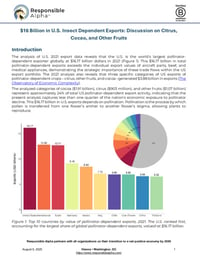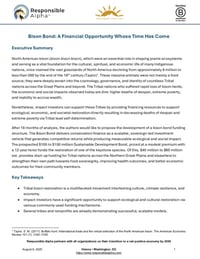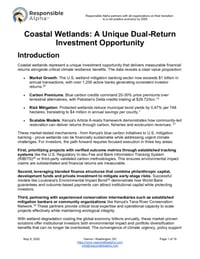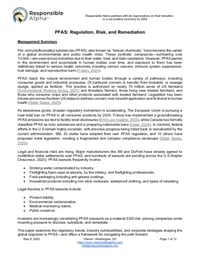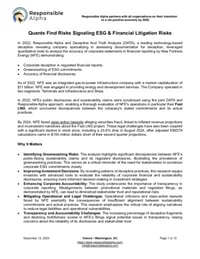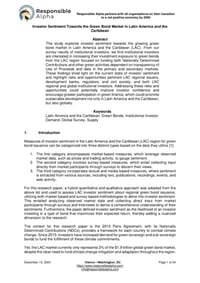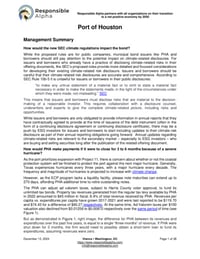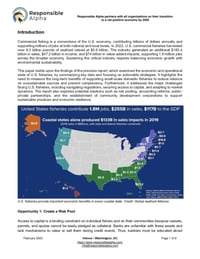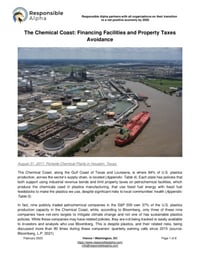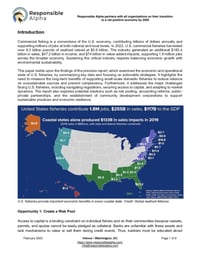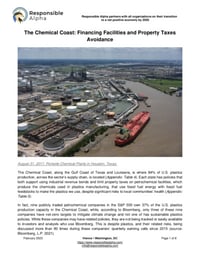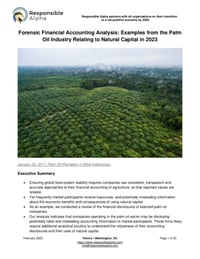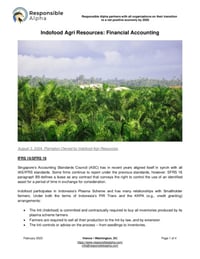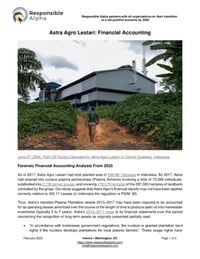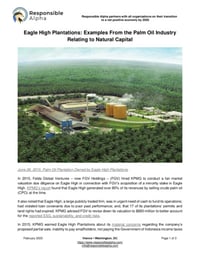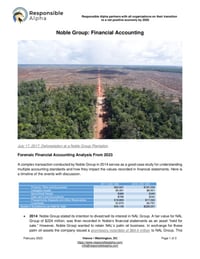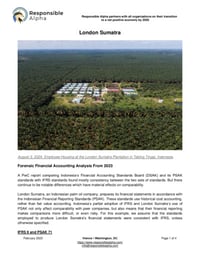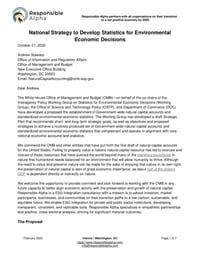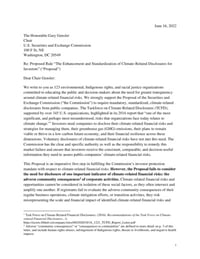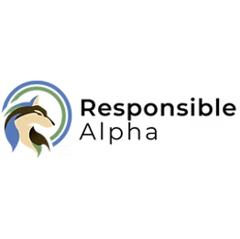
Responsible Alpha
LinkedIn ProfileResponsible Alpha partners with all organizations on their transition to a net positive economy by 2050.
About Organisation
Responsible Alpha partners with all organizations on their transition to a net positive economy by 2050. We are a net zero global management consultancy based upon a rigorous set of values and scientific principles supporting all organizations globally.
We assess:
- Market research & greenwashing risk analysis
- Supply chain analysis
- Climate risk modeling
We build:
- Strategy development & implementation
- Green finance & thematic bonds
We cultivate:
- Capacity building & training
- Corporate reporting & disclosure
Latest Reports
view all$16 Billion in U.S. Insect Dependent Exports: Discussion on Citrus, Cocao, and Other Fruits
Published by Responsible Alpha: This economic study details our worldwide dependency on pollinators (eg: bees) in relation to preserving asset markets and industries globally.
Bison Bond: A Financial Opportunity Whose Time Has Come
Published by Responsible Alpha; This document outlines an innovative tool to support indigenous finance, introducing the bison bond: a social-driven investment aimed at restoring tribal health, fostering economic opportunity, and aiding the bison population.
Coastal Wetlands: A Unique Dual-Return Investment Opportunity
Published by Responsible Alpha: Coastal wetlands represent a unique investment opportunity that delivers measurable financial returns alongside critical climate resilience benefits.
PFAS: Regulation, Risk, and Remediation
Published by Responsible Alpha: Per- and polyfluoroalkyl substances (PFAS) are a large class of synthetic chemicals characterized by strong carbon-fluorine bonds. Given their unique ability to resist water, oil, heat, and stains, they have been used for over 70 years in a wide range of consumer and industrial products. PFAS have become indispensable to industries such as aerospace, textiles, packaging, and electronics. Yet the same characteristics supporting widespread use also make it nearly impossible to break down in nature. As a result, PFAS accumulate in soil, water, animals, and human bodies, where they can remain for decades (J.P. Morgan, 2025).
Natural Capital and Biodiversity in Financial Statements for Accountants
Published by Responsible Alpha
Quants Find Risks Signaling ESG & Financial Litigation Risks
In 2022, Responsible Alpha and Deception And Truth Analysis (DATA), a leading technology-based deception revealing company specializing in assessing documentation for deception, leveraged quantitative tools to analyze the accuracy of corporate statements in financial reporting by New Fortress Energy (NFE) demonstrating: • Corporate deception in regulated financial reports. • Greenwashing of ESG commitments. • Accuracy of financial disclosures. By 2024, NFE faced class-action lawsuits alleging securities fraud, linked to inflated revenue projections and inconsistent narratives about the Fast LNG project. These legal challenges have also been coupled with a significant decline in stock price, including a 23.6% drop in August 2024, after adjusted EBIDTA calculations came in $155 million dollars short of their second quarter projections.
Investor Sentiment Towards the Green Bond Market in Latin America and the Caribbean
This study explores investor sentiment towards the growing green bond market in Latin America and the Caribbean (LAC). From our survey results of institutional investors, we find institutional investors are interested in increasing their investment exposure to green bonds from the LAC region focused on funding both Nationally Determined Contributions and other green activities dependent on transparency of Use of Proceeds and data in the primary and secondary markets. These findings shed light on the current state of investor sentiment and highlight risks and opportunities pertinent LAC regional issuers, development banks, regulators, and civil society, and both LAC regional and global institutional investors. Addressing these risks and opportunities could potentially improve investor confidence and encourage greater participation in green finance, which could promote sustainable development not only in Latin America and the Caribbean, but also globally.
Port of Houston Financial & Climate Risk
Responsible Alpha calculated the financial risks for the Port of Houston $393MM revenue bond from climate risk.
Swimming Upstream: Financial Strategies to Pivot US Fisheries to Sustainability
Published by Responsible Alpha: Commercial fishing is vital to the US economy, contributing billions of dollars annually and supporting millions of jobs. In 2022, the US commercial fishing industry harvested over 8.3 billion pounds of seafood valued at $5.9 billion. Beyond direct harvesting, the industry generated $183.4 billion in sales impacts, $47.2 billion in income, and $74 billion in value-added impacts, supporting 1.6 million jobs across the broader economy. Responsible Alpha provides a summary of options to use sustainable finance to improve U.S. fisheries.
The Chemical Coast: Financing Facilities and Property Taxes Avoidance
Published by Responsible Alpha: The Chemical Coast, along the Gulf Coast of Texas and Louisiana, is where 84% of U.S. plastics production, across the sector’s supply chain, is located. Each state has policies that both support using industrial revenue bonds and limit property taxes on petrochemical facilities, which produce the chemicals used in plastics manufacturing, that use fossil fuel energy with fossil fuel feedstocks to make the plastics we use, despite significant risks to local communities’ health.
Hooked on Finance: U.S. Fisheries Recommendations
Published by Responsible Alpha: Commercial fishing is a cornerstone of the U.S. economy, contributing billions of dollars annually and supporting millions of jobs at both national and local levels. In 2022, U.S. commercial fisheries harvested over 8.3 billion pounds of seafood valued at $5.9 billion. The industry generated an additional $183.4 billion in sales, $47.2 billion in income, and $74 billion in value-added impacts, supporting 1.6 million jobs across the broader economy. Sustaining this critical industry requires balancing economic growth with environmental sustainability.
The Chemical Coast: Financing Facilities and Property Taxes Avoidance
Published by Responsible Alpha: The Chemical Coast, along the Gulf Coast of Texas and Louisiana, is where 84% of U.S. plastics production, across the sector’s supply chain, is located. Each state has policies that both support using industrial revenue bonds and limit property taxes on petrochemical facilities, which produce the chemicals used in plastics manufacturing, that use fossil fuel energy with fossil fuel feedstocks to make the plastics we use, despite significant risks to local communities’ health.
Forensic Financial Accounting Analysis: Examples from the Palm Oil Industry Relating to Natural Capital in 2023
Published by Responsible Alpha: Ensuring global food system stability requires companies use consistent and accurate approaches to their financial accounting of agriculture, so that reported values are reliable. Firms are subject to various accounting regulations under International Financial Reporting Standards (IFRS), or their local accounting standards. Naturally, markets, analysts, and portfolio managers rely on audited financial information to better understand the financial valuation and overall investment thesis in the palm oil sector. Crucial then to this understanding is accurate information. Yet, market participants may receive inaccurate, and potentially misleading information about the economic benefits and consequences of palm oil production.
Indofood Agri Resources: Financial Accounting
Published by Responsible Alpha: Singapore’s Accounting Standards Council (ASC) has in recent years aligned itself in synch with all IAS/IFRS standards. Some firms continue to report under the previous standards, however. SFRS 16 paragraph B9 defines a lease as any contract that conveys the right to control the use of an identified asset for a period of time in exchange for consideration. Indofood participates in Indonesia’s Plasma Scheme and has many relationships with Smallholder farmers.
Astra Agro Lestari: Financial Accounting
Published by Responsible Alpha: As of 2017, Astra Agro Lestari had total planted area of 290.961 hectares in Indonesia. By 2017, Astra had entered into nucleus-plasma partnerships (Plasma Scheme) involving a total of 73,099 individuals, subdivided into 2,736 farmer groups, and covering 178,379 hectares of the 297,000 hectares of landbank controlled by the group. Our study suggests that Astra Agro’s financial reports may not have been applied correctly relative to IAS 17 Leases (in Indonesia the regulation is PSAK 30).
Eagle High Plantations: Financial Accounting
Published by Responsible Alpha: In 2015, Felda Global Ventures – now FGV Holdings – (FGV) hired KPMG to conduct a fair market valuation due diligence on Eagle High in connection with FGV’s acquisition of a minority stake in Eagle High. KPMG’s report found that Eagle High generated over 80% of its revenues by selling crude palm oil (CPO) at the time. It also noted that Eagle High, a large publicly traded firm, was in urgent need of cash to fund its operations; had violated loan covenants due to poor past performance; and, that 17 of its plantations’ permits and land rights had expired. KPMG advised FGV to revise down its valuation to $680 million to better account for the reported ESG, sustainability, and credit risks.
Noble Group: Financial Accounting
Published by Responsible Alpha: A complex transaction conducted by Noble Group in 2014 serves as a good case study for understanding multiple accounting standards and how they impact the values recorded in financial statements.
London Sumatra: Financial Accounting
Published by Responsible Alpha: A PwC report comparing Indonesia’s Financial Accounting Standards Board (DSAK) and its PSAK standards with IFRS standards found mostly consistency between the two sets of standards. But there continue to be notable differences which have material effects on comparability. London Sumatra, an Indonesian palm oil company, prepares its financial statements in accordance with the Indonesian Financial Reporting Standards (PSAK). These standards use historical cost accounting, rather than fair value accounting. Indonesia’s partial adoption of IFRS and London Sumatra’s use of PSAK not only affect comparability with peer companies, but also means that their financial reporting makes comparisons more difficult, or even risky.
U.S. National Strategy on Natural Capital Accounting
Published by Responsible Alpha: The Working Group has developed a draft Strategic Plan that recommends short- and long-term strategic goals, as well as objectives and proposed strategies to achieve a routinely produced set of Government-wide natural capital accounts and standardized environmental-economic statistics that complement and operate in alignment with core national economic accounts and statistics.
Responsible Alpha's SEC Climate Risk Research Used by 123 Institutions
Responsible Alpha developed the business, economic, and investment analysis used by 123 environmental, indigenous rights, and racial justice organizations in their letter to the Honorable Gary Gensler, Chair, U.S. Securities and Exchange Commission on the proposed rule "The Enhancement and Standardization of Climate-Related Disclosures for Investors."
Geographic Reach
Matching countries:

